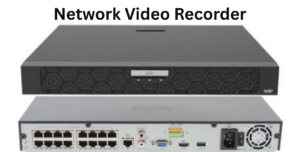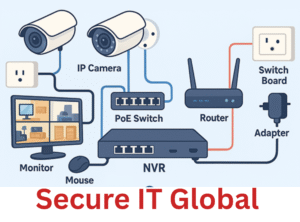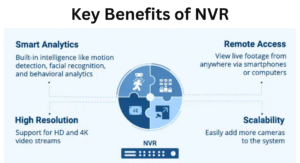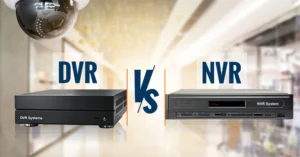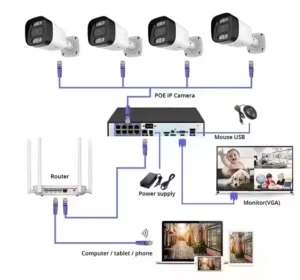Why NVRs the Future of Business Surveillance Systems
Let’s understand in details Why NVRs the Future of Business Surveillance Systems?
📹 What is an NVR?
A Network Video Recorder (NVR) is a specialized system designed to capture, store and manage video data from IP (network) cameras. NVRs are widely used in surveillance systems for both residential and commercial purposes, as they offer several advantages over traditional analog recording solutions. Unlike traditional DVRs, which rely on Analog cameras, NVRs work with digital streams, providing higher resolution, better scalability and remote accessibility. NVRs are the future of business surveillance. At Secure IT Global, we help businesses and homeowners design and deploy NVR-based surveillance solutions that are smarter, faster, and built for the future.
🌟Why NVRs are the Future of Surveillance Systems?
NVRs (Network Video Recorders) have already become the preferred choice for modern surveillance systems, as they offer a host of benefits over traditional analog recording solutions. Here are some compelling reasons why NVRs are the present and future of surveillance systems:
📹 High-Resolution Video – Supports HD and 4K, perfect for identifying faces, license plates, and small details.
📲 Remote Access – View live or recorded footage anywhere via smartphone, tablet, or computer.
🔄 Scalability – Add or remove cameras easily without rewiring your system.
🧠 Intelligent Video Analytics – Motion detection, facial recognition, license plate recognition.
💾 Flexible Storage – Store footage locally or in the cloud with efficient H.265 compression.
💡 Ease of Setup & Maintenance – PoE (Power over Ethernet) support simplifies installation.
🔎Key Technologies Inside NVRs
-
-
H.265 compression (saves storage without losing quality).
-
RAID storage (data protection across multiple hard drives).
-
PoE (Power over Ethernet) (simplifies installation).
-
Cybersecurity features (firewalls, encryption).
-
How NVRs are Revolutionizing Video Surveillance?
NVRs are revolutionizing video surveillance in many ways, providing a more advanced and efficient way of recording and monitoring video footage. Here are some ways in which NVRs are revolutionizing video surveillance: NVRs are a game-changer in video surveillance, providing high-quality video footage with resolutions of up to 4K and higher. Here are some benefits of using an NVR system:
- Remote access: Users can remotely access their surveillance system from anywhere, using a smartphone, tablet, or computer, providing flexibility and convenience.
- Intelligent video analytics: NVRs offer intelligent video analytics, allowing for advanced features such as motion detection, facial recognition, and license plate recognition, which helps identify and respond to security threats quickly and efficiently.
- Scalability: NVRs are highly scalable, making it easy to expand or upgrade the system as needed. Additional cameras can be easily added, and storage capacity can be increased.
- Easy retrieval of footage: NVRs allow for easy retrieval of recorded footage, with the ability to search and playback specific events based on time, date, or other criteria.
- Lower cost: Although the initial cost of an NVR system may be higher than traditional analog systems, the overall cost can be lower in the long run due to the ease of maintenance and the lower cost of storage.
Overall, NVRs provide a more advanced, efficient, and effective way of recording and monitoring video footage, which can help increase security and peace of mind. As technology continues to advance, we can expect NVRs to become even more advanced, providing greater flexibility, functionality, and performance.
🏢 Why Businesses Are Switching to NVRs
-
🏬 Retail stores → Reduce shoplifting and track customer traffic.
-
🏭 Factories & warehouses → Monitor equipment, safety compliance.
-
🏢 Corporate offices → Protect data centers, entrances, and parking.
-
🏨 Hotels & hospitality → Ensure guest & staff safety.
-
🏫 Schools & universities → Secure hallways, playgrounds, and entry points.
-
🏗️ Construction sites → Deter theft and monitor site progress.
📊 NVR vs DVR – Which Should You Choose?
In conclusion, the decision to choose between an NVR or a DVR will primarily depend on your specific surveillance requirements and budget. If you need higher video quality and advanced features and are willing to pay more, an NVR may be a better option. However, if you have a tight budget or currently use analog cameras, a DVR may be a better choice.
🚀 Choosing the Right NVR & Buy NVR System from Secure IT Global
How to Choose the Right NVR
-
Number of channels (how many cameras you need).
-
Storage (30 days vs 90 days retention).
-
AI features (facial recognition, object detection).
-
Remote access capabilities.
-
Brand reliability (Hanwha, Uniview, Montavue, etc.).
At Secure IT Global, we provide:
-
🏆 Authorized solutions from trusted brands
-
👨💻 Professional installation & setup
-
📞 Ongoing support & maintenance
-
💰 Affordable packages for any business size
By considering these factors, you can select the right NVR for your security needs, ensuring that you have an effective and efficient surveillance system in place. Buy NVR Systems for Business Surveillance | Secure IT Global.
✅ Conclusion: NVRs Are the Future of Surveillance
NVRs offer superior resolution, flexibility, and intelligent features compared to DVRs. For businesses that want to future-proof their security, NVRs are the right choice.
👉 Contact today to explore our range of NVR-based surveillance solutions and protect your business with cutting-edge security.
Secure IT Global LLC
167 Madison Ave
New York, NY 10016
(888) 902 2303

